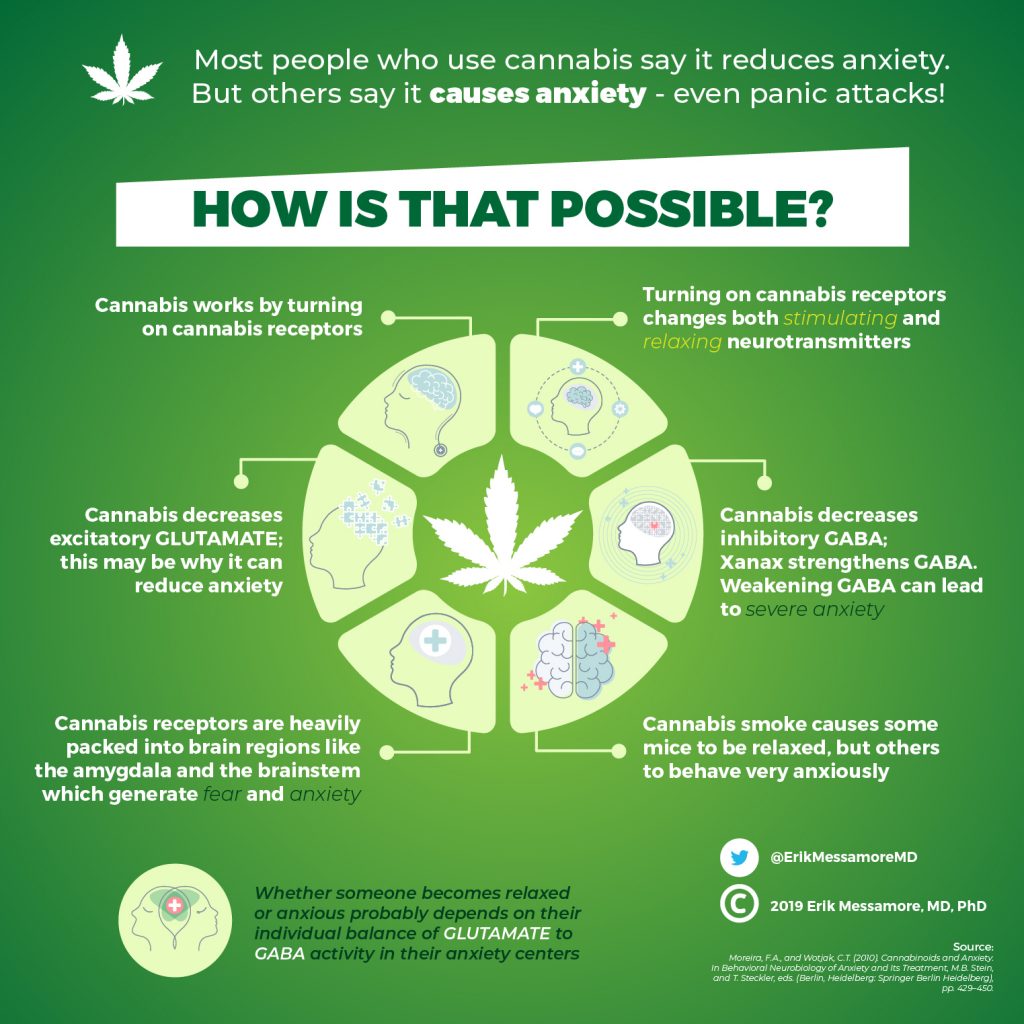Cannabis and Anxiety
Erik Messamore, MD, PhD

Free Download: Printable Infographic
In this post, I offer you a free, downloadable infographic that you may freely share, print, or distribute. Here is the link to the file.
The infographic explains one of the paradoxical effects of cannabis. While it’s calming and anxiety-relieving (at least initially) for many people, cannabis can cause anxiety and panic attacks in others who try it.
I made this infographic to address a question I’m often asked when explaining possible side effects of cannabis “How can something that’s good for anxiety also cause anxiety?”
Cannabis has several of these paradoxical effects. Let’s start with anxiety.
The Bliss Receptor
Ironically, even though cannabis has been used recreationally and medicinally for thousands of years, we’ve only recently discovered the neurochemical systems it affects. Recently, in this case, means less than 30 years. It wasn’t until 1990 that we discovered the specific brain protein that THC interacts with: a receptor protein that was given the name CB1 (short for cannabinoid receptor, type 1). A couple years later, in 1992, we discovered what CB1 was made for: a specialized messenger molecule that got the name anandamide (named after ananda, the Sanskrit word for bliss). The brain makes anandamide to turn on the CB1 receptor when certain nerve cells communicate with each other. Through its CB1 receptor, anandamide controls the levels of two master messengers: the neurotransmitters glutamate and GABA. Understanding what glutamate and GABA do in the brain can explain many of cannabis’ effects.
Glutamate and GABA
Glutamate is the most widely-used neurotransmitter in the brain. More than half of all nerve cell connections (synapses) use glutamate to communicate. Wherever it’s released, the function of glutamate is to stimulate the receiving cell. It’s an excitatory neurotransmitter. It makes brain cells more likely to fire.
But every gas pedal needs a brake, and GABA is that brake. This key neurotransmitter inhibits brain cells, making them less likely to fire. GABA is present in 30% to 40% of all nerve cell connections.
Based on the number of cells that either make them or respond to them, glutamate and GABA are, by far, the most important signaling molecules in the brain. And the THC from cannabis affects both of them. Some 80% of brain cell communications are susceptible to THC influence. No wonder cannabis gives people a buzz — or makes some of them anxious.
Anxiety Centers in the Brain
Although anxiety is a team sport involving many neurological and psychological processes, two brain regions stand out as the most important players: the amygdala, near the front of the brain, and a part of the brainstem called the periaqueductal gray matter.
The amygdala is part of the limbic system, the emotion-producing part of the brain. The amygdala lights up in situations where fear (or aggression) is called for. It generates the psychological experiences of fear (or anger) and helps to shape fearful or angry thoughts. At the same time, nerve cells in the brainstem are linked to the internal organs that generate fight-or-flight physiology. Brainstem activation causes the pulse to quicken, the blood pressure to rise, the skin to prickle, and the gut to sink. The amygdala sparks the emotion and molds the thoughts of anxiety. The brainstem transmits it to the body.
CB1 receptors are densely packed within these anxiety centers.
Chill or Dread?
With CB1 receptors packed into these key anxiety centers, cannabis clearly has the potential to influence anxiety. But it could go either way based on whether stimulatory glutamate or inhibitory GABA is in control.
If the anxiety centers are under the control of glutamate, then the glutamate-lowering effect of cannabis would slow down their activity. This would feel relaxing for many people as the amygdala or brainstem slow down. But if those centers were more controlled by GABA, then cannabis would have the opposite effect. The GABA-reducing effect of cannabis in this situation would be like taking the foot off the brake. Decreasing the signal of this key inhibitory neurotransmitter could rev up the anxiety centers and trigger anxiety, or a panicky fight-or-flight response.
Conclusion
Most people who use cannabis find it relaxing, and there are clinical studies that show it can relieve anxiety in many who use it. Many people are surprised to hear that it might also provoke anxiety. But it really shouldn’t be all that surprising. Paradoxical effects happen all the time in medicine. For example, serotonin-boosting medications like Prozac have FDA approval to treat anxiety disorders. Like cannabis, they help many people with anxiety issues. But Prozac and related medications can also provoke anxiety in some who take it. Cannabis can do the same thing. I hope this infographic will help you understand why.
Disclaimers
This article summarizes the results and conclusions of articles published in the medical literature. It is for general information. It is not a substitute for medical advice, and readers are admonished not to enact or change treatments based on this article. Always seek the advice of your doctor before starting or changing treatment.
The thoughts, views, and opinions expressed in this article are my own and do not reflect or represent the policy or position of Northeast Ohio Medical University